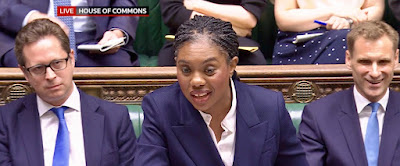I don’t think I have seen anything more ugly in Parliament than Chris Philp (Shadow Home Secretary, on the right) grinning while Kemi Badenoch taunted with relish the clearly distressed Rachel Reeves: "She looks absolutely miserable." To give them their due, clearly not all Ms Badenoch's colleagues were so entertained by her remarks. But it was badly done, indeed.
When I made a comment about this on Facebook, one friend replied, "I didn’t think it could get worse than a woman going another woman for being 'miserable'. Maybe Kemi is so soulless that she’s happy to break the sisterhood. My 89yo Dad said, 'I didn’t think much of her [KB] in the first place, but now I’ve absolutely no respect whatsoever'. Utterly appalling behaviour." In my view it is no excuse to say that anything goes in politics. It should not. There's no excuse for a lack of compassion in people whose business is to care.Another friend commented, "It's profoundly sad that the gift of tears should be a cause of such mockery. Fear of vulnerability makes us less than human." This is something that I have learned since having MND, a condition which has exposed my emotions much to my initial discomfort. The technical term the medics use is 'lability'. I think of it as emotion unwrapped. In an article a mental health expert wrote, "Tears of pain should inspire us to reach out to the one in pain with compassion not contempt" (Rachel Newham, in Seen and Unseen).
My son and daughter-in-law visited us on Sunday and we talked among other things about Glastonbury. They recommended catching up on The Ezra Collective and we agreed that Lewis Capaldi had been a highlight. Sarah wrote to me, "He is amazing! And follow him on insta. I watched his set a couple of years ago - when he had to finish early. And then 2025 his comeback :)" In a perceptive article in Seen and Unseen, Why we loved Lewis Capaldi's Glastonbury comeback Jessica Norman wrote, "Strength and weakness are not opposing forces; instead, they are intertwined. The bridge connecting them is vulnerability. Strength in weakness provides us with a portrait of actual vulnerability, as sharing our weakness requires great strength. It has been said by many that although we might impress people with our strength, we connect with people through our weaknesses. This vulnerability provides the connection that we are built for as humans.
"In a culture that celebrates performance, progression, and perfection, vulnerability often feels like a risk. But what if it’s our greatest strength? What if this, the trembling voice, the open heart, the tear-streaked face, is what connection is made of?"
I was reminded how Sir Gregory Doran, the great Shakespeare director, described on Desert Island Discs Anthony Sher's explosively intense performance of Shylock's speech, "I am a Jew. Hath not a Jew eyes? hath not a Jew hands, organs,
dimensions, senses, affections, passions? fed with
the same food, hurt with the same weapons, subject
to the same diseases, healed by the same means,
warmed and cooled by the same winter and summer, as
a Christian is? If you prick us, do we not bleed?
if you tickle us, do we not laugh? if you poison
us, do we not die?" That should be the moment when our antipathy and our incipient anti-semitism are replaced, at least temporarily, by total empathy and shared humanity.
The tragic thing about Wednesday's performance in the House of Commons is that many MPs and most of the media apparently lost their connection with vulnerability, their sense of shared humanity. They chose not to believe that Ms Reeves' tears might have arisen from a "personal matter". In my experience what appears on the surface often has subterranean roots. Thank goodness even our toughest politicians aren't all performance but can show us their real humanity. We should not pillory them; we should rather honour them for it.


No comments:
Post a Comment